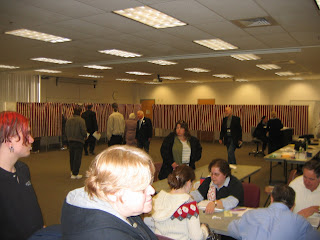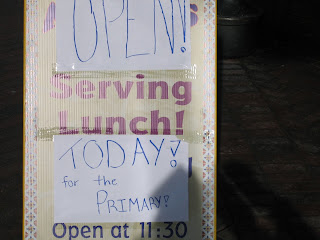Florida Launch
McCain won his first closed primary, one where only Republicans can participate, riding a coalition of Hispanics, military veterans, seniors, and moderates to victory. Romney prevailed amongst only conservatives, and even lost to McCain among those who considered the economy of the top issue. Romney, McCain and Huckabee effectively split the evangelical vote, and the Romney camp claimed that Huckabee is helping deliver the race to McCain by staying in the race. Some polls contradict this contention, however, as Huckabee voters tend to list McCain as their second choice.
Giuliani's disappointing finish in the state he pinned all of his hopes will lead to his withdrawal from the race later today. He is expected to endorse McCain in a ceremony preceding tonight's California debate at the Reagan Library and Museum. Rudy's late-state strategy proved misguided, and now the former Mayor will direct his troops to help good friend and fellow moderate John McCain clinch th GOP nomination.
Romney, despite outspending McCain 8-to-1, vows to fight on with 21 Feb. 5 contests in mind, and will likely sink further into his own personal fortune, $40 million of which he has already spent. While his prospects of catching McCain are diminished in light of last evening's results, he will make a case that he is the candidates conservatives can rally around. Other than Utah and Massachusetts, however, there are few states on the Super Tuesday map one can circle definitively for Romney.
Expect McCain to dominate in the Northeast, Massachusetts excepted, while also competing strongly in California, Illinois, and even Georgia. With Huckabee remaining in the race, he may block any sort of southern strategy that Romney pursues for a comeback. In sum, this is McCain's nomination to lose, and I expect him to start consolidating party support even among conservatives in the week ahead. It is likely that one week from today we will consider McCain the presumptive nominee.
Turning to the Democrats for a moment, Sen. Hillary Clinton claimed a decisive, if hollow, victory of Sen. Barack Obama in Florida, besting the junior IL senator 50% to 33%. Former Sen. John Edwards, who finished with 14% of the vote, withdrew from the race this afternoon. He did not make an endorsement.
Clinton flew to Florida last evening to proclaim success in a state where none of the Democratic candidates campaigned. Even though she was awarded no delegates, she can hold up the fact that she won more votes than McCain in an important swing state, at least slowing Obama's momentum from Saturday's South Carolina victory and successive Kennedy endorsements in the two days that followed.
Edwards' exit provides no immediate clues as to how it will impact the remaining Democratic candidates. He pitched a message of change similar to Obama, yet appeals to the traditional blue-collar base of the party. My guess is that it helps Obama nationally, but Clinton in southern states where the vote divides along racial lines as it did in the Palmetto State.
As for Feb. 5, Clinton will pursue a big state strategy focusing on the Northeast, including her home state of New York, California, and of course dispatching Bill to Arkansas to make some southern inroads. Obama has chosen a more unconventional "red" state path, seeking to capitalize on his campaign's effective turnout machine in caucus states like Minnesota, North Dakota, Kansas and Alaska. He'll also try to roll through the South, with Missouri and Georgia as the largest prizes.
I predict that Clinton emerges with more delegates, but Obama competes toe-to-toe with state victories. This contest will last well beyond next Tuesday as both candidates have the organizational and fundraising capacity to fight through the convention. My money remains with Clinton, but Barack may very well steal the nomination at the finish line.
I'll return with a Tsunami Tuesday prediction next Monday. Until then, tune into our latest podcast, recorded this morning, summarizing the latest developments in the presidential race. For those of you in the area, come to our first Smart Mouth program next Wednesday at the Freedom Museum (click on "events and information") where I will sit on a panel with three other guests to discuss the results of the 24 state contests slated for a single day.
 eorge H.W. Bush and is currently the executive vice president of APCO’s International Advisory Council in Washington, D.C., and Rick Pearson, a political reporter for Chicago Tribune and an award winning journalist, who in 2000 and 2004 extensively covered George W. Bush’s presidential campaigns.
eorge H.W. Bush and is currently the executive vice president of APCO’s International Advisory Council in Washington, D.C., and Rick Pearson, a political reporter for Chicago Tribune and an award winning journalist, who in 2000 and 2004 extensively covered George W. Bush’s presidential campaigns.
































